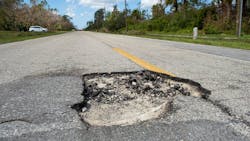AI could make potholes a thing of the past, thanks to self-healing asphalt
Everyone has a nemesis. Batman has the Joker. Superman has Lex Luthor. Seinfeld has Newman. But when it comes to your car, its foe is undoubtably potholes. Potholes can spell disaster for your tires, wheels, suspension, and much more. Worst of all, potholes can leave a crater-sized hole in your wallet. Fixing the problem, however, can be just as irritating. Filling potholes is time consuming, causes unnecessary traffic, and is a financial burden to cities. But what if we could prevent potholes before they ever form?
Researchers from Swansea University and King’s College London, in partnership with scientists in Chile, are working to eradicate potholes from our modern infrastructure. The team is working on a new type of asphalt that would have the ability to heal itself when cracks begin to form.
In a recent quote, Dr Francisco Martin-Martinez, an expert in computational chemistry at King’s College London, said, “In our research, we want to mimic the healing properties observed in nature. For example, when a tree or animal is cut, their wounds naturally heal over time, using their own biology. Creating asphalt that can heal itself will increase the durability of roads and reduce the need for people to fill in potholes.”
At first glance, potholes might not seem like a problem worthy of scientific intervention. When you look at the statistics, however, it becomes clear that potholes are a much bigger, more costly problem than any of us realize. According to data from the 2024 Annual Local Authority Road Maintenance Survey Report, an independent survey of local authority highway departments in England and Wales, the number of filled potholes across the region increased 43% to 2.0 million in 2024. With the cost to fill a pothole averaging about £72.26, that brings the total cost of pothole repair to approximately £143.5 million, an increase of 50% over the previously reported year.
Potholes begin as cracks in bitumen, which is the black material found in asphalt mixtures, as it hardens through oxidization. The researchers have been working on a new method to reverse these cracks, stitching the asphalt back together to create more durable roads and highways.
To accomplish this task, the team leaned heavily on machine learning. According to Iain Burgess, Director, Public Sector UK, Google Cloud, “The team used machine learning, a type of AI, to study organic molecules in complex fluids like bitumen. The team developed a new data-driven model to accelerate atomistic simulations, advancing research into bitumen oxidation and crack formation. This approach is significantly faster and more cost-effective than traditional computational models.
Additionally, the researchers collaborated with Google Cloud to develop tools that can identify chemical properties and enable the creation of virtual molecules designed for specific purposes, similar to techniques used in drug discovery.”
The team published their findings in a paper titled “Data-driven representative models to accelerate scaled-up atomistic simulations of bitumen and biobased complex fluids.” In an excerpt from the abstract, the team writes: “Complex molecular organic fluids such as bitumen, lubricants, crude oil, or biobased oils from biorefineries are intrinsically challenging to model with molecular precision, given the large variety and complexity of organic molecules in their composition. Large scale atomistic simulations have been historically limited by this complexity, which has hampered the bottom-up molecular design of these materials, something especially relevant given the current surge of biobased fluids for sustainable applications and the cost of trial-and-error experimental developments. To address this limitation, we have developed an author-agnostic computational framework to generate data-driven representative models of any complex mixture of organic molecules directly from Gas Chromatography-Mass Spectrometry (GCMS) experimental characterisation, thus reducing human biases in model creation and providing a platform for self-driven digital development of molecular organic fluids. The method proposed generates statistically representative molecular samples that simplify the complexity of the fluid in a limited group of molecules, while capturing the critical chemical features needed to describe the overall properties of the mixture.”
Utilizing tiny, porous materials known as spores, the team was able to engineer its revolutionary self-healing asphalt. When cracks in the asphalt begin to form, recycled oils housed within the spores are released, helping to reverse the process. Despite the complexity of the asphalt, the team reported that microcracks could be completely healed in less than an hour.
Dr Jose Norambuena-Contreras, a Senior Lecturer in the Department of Civil Engineering at Swansea University, recently said, “We are proud to be advancing the development of self-healing asphalt using biomass waste and artificial intelligence. This approach positions our research at the forefront of sustainable infrastructure innovation, contributing to the development of net-zero roads with enhanced durability."
The Lighter Side of Manufacturing
Created by the editors of Plant Services and New Equipment Digest, The Lighter Side of Manufacturing is a feel-good blog that showcases how advances in science, math, engineering, and technology are making our world more whimsical. Here’s another post that is guaranteed to brighten your day.
Smart pen merges traditional handwriting with digital organization
Nuwa’s smart pen lets you write anywhere and syncs your handwritten text to apps for easy integration with daily tasks.
About the Author
Alexis Gajewski
Senior Content Strategist
Alexis Gajewski has over 15 years of experience in the maintenance, reliability, operations, and manufacturing space. She joined Plant Services in 2008 and works to bring readers the news, insight, and information they need to make the right decisions for their plants. Alexis also authors “The Lighter Side of Manufacturing,” a blog that highlights the fun and innovative advances in the industrial sector.
